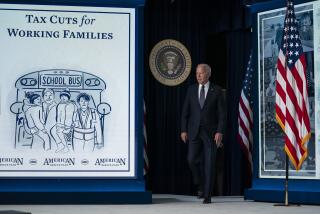Romney’s full of wind on tax credit
It seems there is a way to get conservatives to support government handouts: Hand them out to conservatives.
As Times staff writers Alana Semuels aud Seema Mehta reported, Mitt Romney is getting himself into trouble with Republican voters in swing states such as Iowa by supporting a bedrock Republican principle: He wants to end the production tax credit for wind energy and force power producers to compete on an even playing field with no government interference. Iowa farmers, many lifelong Republicans, also tend to oppose government support when it goes to other people. But in recent years they’ve been installing wind turbines on their land that, particularly in the midst of the current drought, have become a more reliable source of income than crops.
In Iowa, in fact, wind supplies about 20% of the state’s electricity needs, and the industry has created 7,000 jobs. Between ethanol subsidies and the wind power tax credit, Iowa, which controls six electoral college votes and could swing toward either presidential candidate in November, is a state whose economy is deeply reliant on government “interference.”
COMMENTARY AND ANALYSIS: Presidential Election 2012
Iowa’s wind farmers are actually quite right about the production tax credit, even if it’s for the wrong reason. Set to expire at the end of the year without congressional reauthorization, it pays a tax credit to wind producers of 2.2 cents per kilowatt hour they generate. Romney’s contention that the government should stop picking winners and let clean-energy producers compete in the free market against generators of cheaper power such as coal-fired electricity displays a basic misunderstanding not only of what coal does to the environment but of what it does to the economy.
Coal-fired power represents a market failure: Producing it results in serious costs that aren’t borne by the generator but by everyone else, which is why coal that seems cheap is actually extremely expensive. Coal plants emit mercury that ends up in the oceans and makes fish unsafe to eat; vast quantities of sulfur dioxide, which causes acid rain; nitrogen oxide and particulate pollution, which cause multiple lung ailments; and, most devastatingly, carbon dioxide, which fuels climate change. All of these have an economic cost, particularly global warming, which over time will destroy infrastructure, spur mass human migration, burn up crops and otherwise have an incalculably negative effect on future world economies.
Needless to say, it’s worthwhile to continue government subsidies for renewable power sources that come with none of these uncaptured costs, especially because as renewable power generation grows, it becomes cheaper and more competitive on its own. The price of wind power has dropped more than 90% since 1980, according to the American Wind Energy Assn. The nation derived just 2.9% of its energy from wind in 2011 but is capable of getting to 20% within two decades, creating economies of scale that would radically lower wind energy prices. Paying subsidies now means we won’t have to pay them later.
There is actually considerable Republican support in Congress for expanding the tax credit, a reflection of the fact that more than 81% of the installed wind capacity in the U.S. is in Republican-majority states. Which just goes to show that conservatives, who tend to have a little trouble seeing past their immediate self-interest, can be persuaded to behave in an environmentally responsible way. You just have to pay them.
ALSO:
Kinsley: Hitting Romney below the belt?
Follow Dan Turner on Facebook
More to Read
A cure for the common opinion
Get thought-provoking perspectives with our weekly newsletter.
You may occasionally receive promotional content from the Los Angeles Times.










